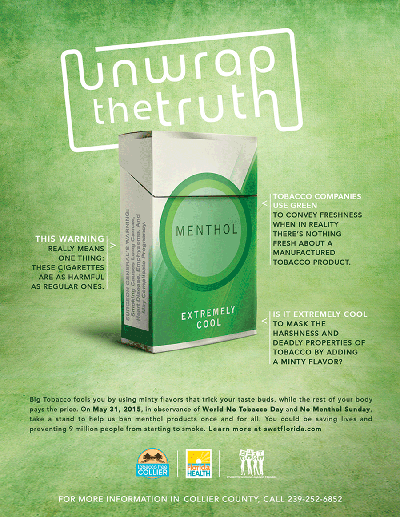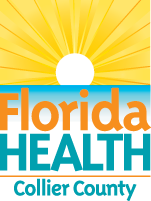It's a New Day in Public Health.
The Florida Department of Health works to protect, promote, and improve the health of all people in Florida through integrated state, county, and community efforts.
Unwrapping the Truth about Menthol: Collier County SWAT is Raising Awareness of the Dangers of Menthol Tobacco Products
May 20, 2015

-World No Tobacco Day is May 31-
This year, the National African American Tobacco Prevention Network’s (NAATPN) approach to World No Tobacco Day is “No Menthol Sunday.” Collier SWAT is joining this important movement to educate Collier students about the added dangers of menthol cigarettes. SWAT clubs at Seacrest County Day School and Everglades City School are creating an awareness campaign for their peers to “unwrap the truth” about menthol products and highlight the 88 Floridians who die each day as a result of tobacco related disease.
Tobacco on its own is already highly addictive because of nicotine. Tobacco companies add chemical additives to cigarettes to make them even more addictive.1 Menthol is one of these additives – even in cigarettes not necessarily labeled menthol.
“According to a 2013 report published by the Food and Drug Administration, mentholated cigarettes are more appealing to new smokers, more addictive to longtime smokers and pose a greater threat to the public's health than unflavored cigarettes2.” said Tobacco Prevention Specialist, Melissa Peacock with the Florida Department of Health in Collier County.
Evidence from once-secret tobacco industry documents shows that tobacco companies have deliberately targeted young people and African American populations with menthol cigarette advertising.3,4,5,6 In fact, data has shown that youth cigarette smokers, ages 12 to17, use menthol at higher rates than adults, even those ages 18 to 25.7,8
“Menthol is just a trick to get people thinking they are getting something fresh when really they are getting a flavoring just to cover up the real taste of something bad for them,” said Seacrest County Day School SWAT member Jamie.
“Many Floridians are unaware that menthol makes cigarette smoking easier to start and harder to quit,”9 said Tobacco Free Florida Bureau Chief Shannon Hughes. “We want to raise awareness about this serious concern and let menthol users know that while quitting can be difficult, the state has free services that can help significantly.”
Tobacco Free Florida offers residents free services that can double a tobacco user’s chances of successfully quitting.10 Tobacco Free Florida’s 3 Free & Easy Ways to Quit include:
- CALL: Call the Florida Quitline at 1-877-U-CAN-NOW to speak with a Quit Coach® who will help you assess your addiction and help you create a personalized quit plan.
- CLICK: Tobacco Free Florida’s online cessation tool can be accessed at tobaccofreeflorida.com/webcoach.
- COME IN: Sign up for group classes at your local Area Health Education Center (AHEC) by calling toll free 877.819.2357 or visiting www.ahectobacco.com/classes-by-county.
For more information, please visit swatflorida.com.
ABOUT WORLD NO TOBACCO DAY
World No Tobacco Day is a national day of awareness highlighting the health risks associated with tobacco use and advocating for effective policies to reduce tobacco consumption. World No Tobacco Day was created by the World Health Organization (WHO) in 1987, and is observed by all United Nations (UN) Member States annually on May 31.
ABOUT SWAT
SWAT is Florida's statewide youth organization working to mobilize, educate and equip Florida youth to revolt against and de-glamorize Big Tobacco. SWAT is a united movement of empowered youth working towards a tobacco free future. For more information, please visit www.swatflorida.com.
ABOUT TOBACCO FREE FLORIDA
The department’s Tobacco Free Florida campaign is a statewide cessation and prevention campaign funded by Florida’s tobacco settlement fund. Tobacco users interested in quitting are encouraged to use one of the state’s three ways to quit. Since 2007, more than 126,000 Floridians have successfully quit, using one of these free services. To learn more about Tobacco Free Florida and the state’s free quit resources, visit www.tobaccofreeflorida.com or follow the campaign on Facebook at www.facebook.com/TobaccoFreeFlorida or on Twitter at www.twitter.com/tobaccofreefla.
The department works to protect, promote and improve the health of all people in Florida through integrated state, county and community efforts.
Follow us on Twitter at @HealthyFla and on Facebook. For more information about the Florida Department of Health please visit www.floridahealth.gov.
[1] Campaign for Tobacco-Free Kids (2014). Designed for Addiction: How the Tobacco Industry Has Made Cigarettes More Addictive, More Attractive to Kids and Even More Deadly. 23 June, 2014. http://www.tobaccofreekids.org/content/what_
2 FDA. Preliminary Scientific Evaluation of the Possible Public Health Effects of Menthol Versus Nonmenthol Cigarettes. July 2013. Web.
3 U.S. Department of Health and Human Services. Preventing Tobacco Use Among Youth and Young Adults: A Report of the Surgeon General. Atlanta: U.S. Department of Health and HumanServices, Centers for Disease Control and Prevention, National Center for Chronic Disease Prevention and Health Promotion, Office on Smoking and Health, 2012
4 Kreslake JM, Wayne GF, Connolly GN. The menthol smoker: tobacco industry research on consumer sensory perception of menthol cigarettes and its role in smoking behavior. Nicotine Tob Res. Apr 2008;10:705-715.
5 Cruz TB, Wright LT, Crawford G. The menthol marketing mix: Targeted promotions for focus communities in the United States. Nicotine Tob Res. 2010;12(SUPPL. 2)
6 Anderson SJ. Marketing of menthol cigarettes and consumer perceptions: a review of tobacco industry documents. Tob Control. 2011;20 Suppl 2:ii20-28.
7 Giovino GA, Villanti AC, Mowery PD, et al. Differential trends in cigarette smoking in the USA: is menthol slowing progress? Tob Control. Sep 27 2013.
8 Caraballo RS, Asman K. Epidemiology of menthol cigarette use in the United States. Tob Induc Dis. 2011;9 Suppl 1:S1.
9 U.S. Department of Health and Human Services. The Health Consequences of Smoking—50 Years of Progress: A Report of the Surgeon General. Atlanta: U.S. Department of Health and Human Services, Centers for Disease Control and Prevention, National Center for Chronic Disease Prevention and Health Promotion, Office on Smoking and Health, 2014.
10 Fiore MC, Jaen CR, Baker TB, et al. Treating tobacco use and dependence: 2008 update. Clinical practice guideline. Rockville, MD: US Department of Health and Human Services, Public Health Service; 2008. Web. www.surgeongeneral.gov/tobacco/treating_tobacco_use08.pdf.





Connect with DOH